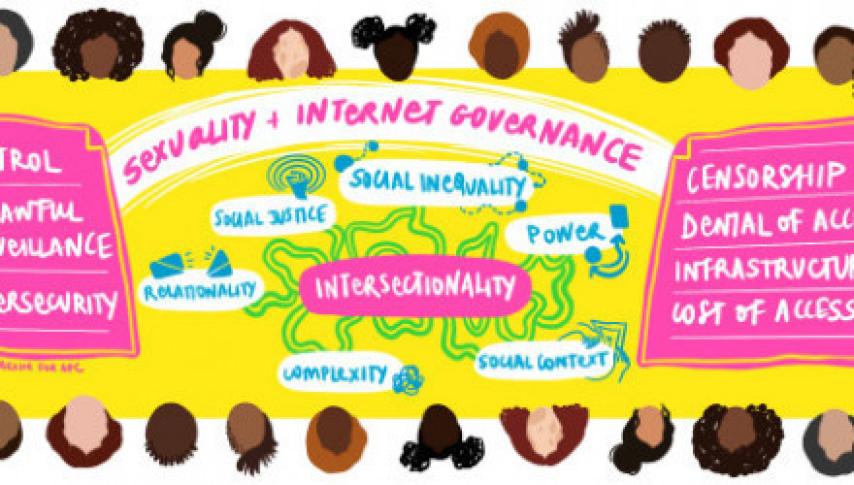
Governance sounds like a very complicated abstract term! One that reminds us of formal education, sophisticated knowledge and soft yet complex skills.
The internet, meanwhile, with its billions of users, seems to be a more popular concept, yet when explored, it shows its many layers: infrastructure, protocols, content, jurisdiction and so on.
That’s why a module that addresses capacity building through feminist and intersectional lenses is so necessary. Bringing sexuality within the domains of change and dialogue of internet governance is bringing our bodies to the core of the next world which is already here.
Sexuality addresses multiple structural discriminations. It is also censored, controlled, accused and blamed for the destruction of cultural values. It is used to generate business and revenue, or to exploit. It is used to model and frame desires, and to create social acceptability, as well as hierarchy.
We have to take the challenge and unpack the conceptualisation of internet governance, link it to sexuality to move from its abstract, mental construction to an “embodied” one.
To do this, we need to re-tell many stories. We need to fill in the gaps of who is an actor, what makes an actor, and what powers these different actors can exercise, access.
We will need to re-understand how the internet works and evolved. The development of the internet as a glorious evolution of humankind is not helping us. It is looking at it through the very real bodies that enrich and live and locate themselves within specific cultures, ideologies and frameworks that matters. That will give us back the internet to our physical as well as digital personas.
Bodies reveal themselves along a layered and multidimensional spectrum of intersections of (more or less) structural privileges and/or intersections of (more or less) structural discriminations.
So to the question why a feminist, sexual rights activist, LGBTQAI person should enter internet governance, the answer is: to make visible the structural discrimination our internet is suffering and, by extension, our bodies and lives are paying for/with.
If we want to embody the internet of people, the very same feminist intersectional lenses make it easy to see how our gendered bodies, located in the continuum of our digital lives, are forced to conform to an internet that is built, developed and performed using just one lens of structural privileges.
This lens assumes itself as the norm, a dogma and self-asserted progress rooted in the positivist constructions of colonial/imperialist elites moving across time and technologies to preserve their own structural privileges extended by affinity to the ones that assimilate.
The internet, which might seem like a place of endless possibilities, is the servant of a minuscule population, accumulating on the work, desires, creations of the entire humanity. Including, excluding, exploiting while constantly imposing the one-fit-to-all as a generous gift while it is just a-white-hetero-binary-fit-to-all.
Consensus assumed.
We are our bodies and whereever we are, and our experience of internet governance is embodied. To ensure a feminist internet, we have to participate, engage and transform how internet governance takes place, and ensure that it is not the will of the few acting upon the lived reality of all.
The multistakeholder intersectionality model
This module is double-fold, and intends to make visible the intersectionality that is entrenched but unspoken in the multistakeholder model of internet governance spaces.
The assumption of the multistakeholder model is that there are these large communities of actors: the private sector, governments, media, civil society, the technical community and intergovernmental organisations, and that their interaction will generate dialogue, suggest scenarios and prompt actions.
As with the idea of the global market being enough by its sole existence to generate “benefits for all”, capacity building around multistakeholder models fails to unpack and understand the diversity and intersectionality inside each part of this community.
This module intends to address and look at internet governance bringing the perspectives and embodied lived experience of feminists, sexual rights activists and LGBTQAI communities.
Are our bodies sitting at the most mainstreamed intersection of structural privileges: patriarchy, whiteness, capitalism, ableism and heteronormativity?
Or are our bodies the ones at the margin, statusless bodies that sit at the exact intersection of structural discriminations: race, gender, sex, class, caste, age, disability, sexual orientation?
What we propose is to move from an intellectual, analytical exercise to one that tries to decolonise the internet and its governance. That’s why gender cannot be the one and only lens that addresses structural discrimination. We need to explore all structural discriminations.
Addressing gender in internet governance spaces opened the door to the entire humanity. Still it has to constantly respond to the threats of reducing gender within the stereotypical binary of women and men. And from here, to constantly respond to the threats of reducing gender to women, forgetting women have varied races, castes, classes, education, age, disabilities, locations, languages.
It is only this variety that will help to escape the tokenism trap set around gendered bodies.
The second aim of this module is to acknowledge and celebrate the experiences of advocates. The stories and insights from Sri Lankan, Nepali and Indian contributors are populating this module with their needs, their strategies and visions, and their claim on the space in its entirety and not as a residual subject for lightning talks.
Table of contents
Learning objectives and activities
Read the full module here
Contributors: Developed for APC by Angela M. Kuga Thas and Serene Lim of KRYSS Network. hvale vale APC WRP contributed to the Introduction and the Input “Intersectionality and Internet Governance”. Practices and experiences from South Asia where created by Sachini Perera, Shuhbha Kayasta and Smita Vanniyar, they offer a first account of Internet Governance and Sexuality from feminist perspective.